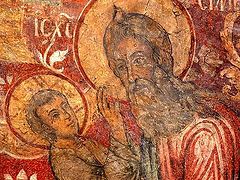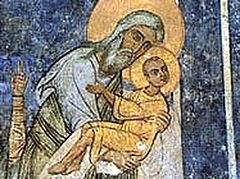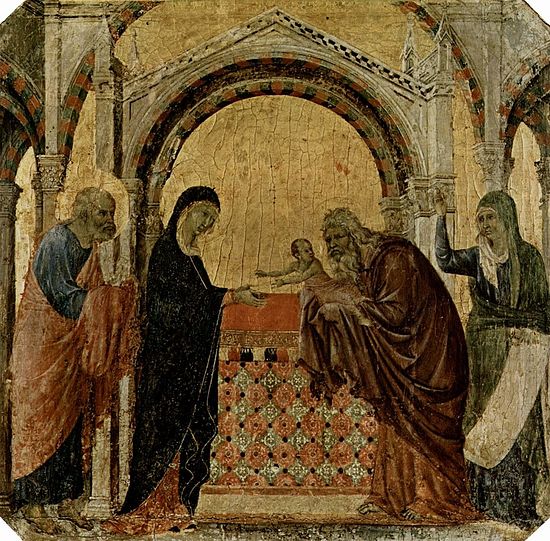 Duccio di Buoninsegna. The Meeting of the Lord. Photo: Wikipedia
Duccio di Buoninsegna. The Meeting of the Lord. Photo: Wikipedia
On the feast of the Meeting of the Lord on February 2, Elder Zacharias (Zacharou) from St. John the Baptist Monastery in Essex, England visited and served at the Monastery of St. John the Forerunner in Mesa Potamos, Cyprus. The service was headed by His Eminence Metropolitan Athanasios of Limassol, the Elder of the Cypriot Monastery, which graciously offered us a translation of a portion of Elder Zacharias’ festal homily:
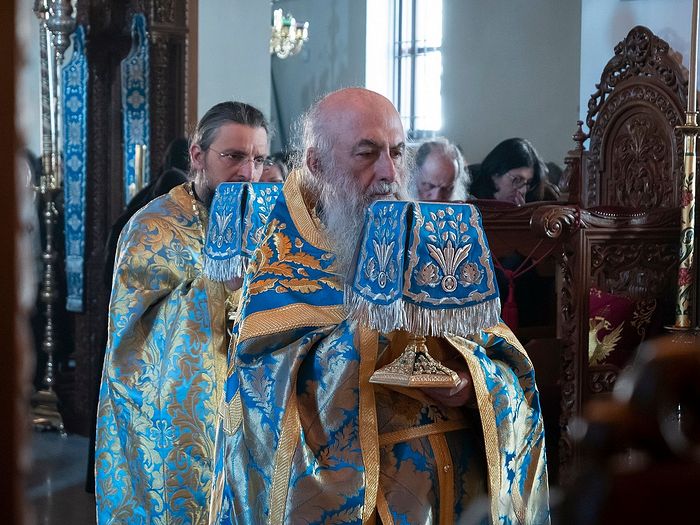 Elder Zacharias and Abbot Paisios during the Great Entrance
Elder Zacharias and Abbot Paisios during the Great Entrance
In today’s Apostle reading, St Paul speaks about a change that occurred in the priesthood through Christ. In the Old Testament, the priesthood descended from the tribe of Aaron and every first-born male child of this tribe inherited the priesthood from his father. As St Paul says, this was a law of carnal commandment (Heb. 7:16). Now, with the coming of Christ, we have a new, royal priesthood. Christ descended from the tribe of Judah, which was a royal tribe, but did not have the gift of priesthood. This signifies that, before all worlds, He is God and Lord of all and so, He naturally has this royal property. Thus, through His incarnation, priesthood is introduced in the tribe of Judah.
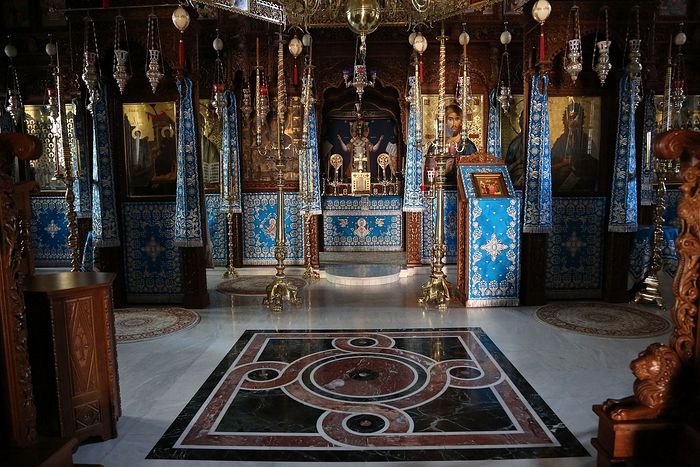 The monastery church bedecked in blue, the color of the Mother of God
The monastery church bedecked in blue, the color of the Mother of God
By assuming human flesh, Christ reveals His priesthood in the world. Why is this? Because it is with this flesh that He suffered death on the Cross and it is in His sacrifice that His priestly ministry for the reconciliation of the world with God was established. Yet, the priesthood of Christ does not only consist in His sacrifice, but also in the divine energy which He bore within Himself as God. His priesthood is founded on the endless life which He had in Himself, as St Paul says: Not after the law of a carnal commandment, but after the power of an endless life. We all received the royal priesthood when we were baptized. The royal priesthood means that, by the grace of God, we can all imitate Christ and become like Him, including the whole world in our hearts just as He brought the whole world before God the Father in His prayer and through His crucifixion.
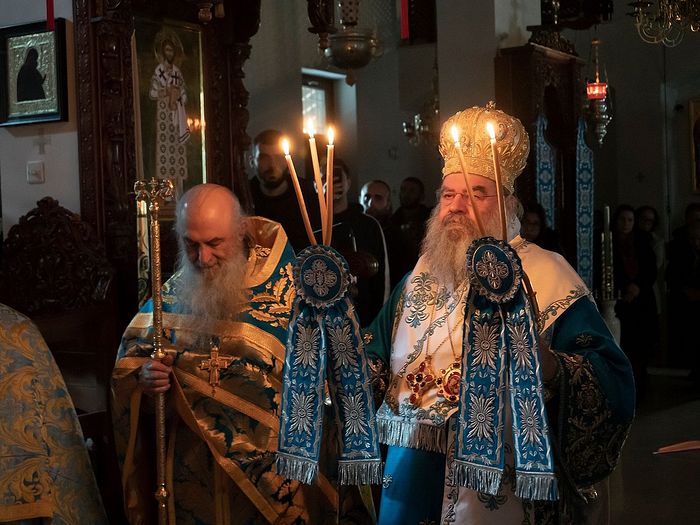 Metropolitan Athanasios of Limassol (right), Elder Zacharias (left)
Metropolitan Athanasios of Limassol (right), Elder Zacharias (left)
Today Joseph and the Mother of God bring the Child to present Him before the Lord, and it is very moving, because Christ is brought as an Infant to the temple which was built for Him, for He is the Lord. For this reason, this feast of the Meeting of the Lord in the Temple is also named the Presentation of the Lord. Through His incarnation, Christ performed a twofold presentation: He came down from the bosom of His Father and He manifested into the world the love of the Father, which is a love unto the end. However, by dying on the Cross, being buried, risen from the dead and then ascending to Heaven, He presented to God the Father the true man, as He was foreordained by God before all ages. Christ is He Who first presented the true man as the true image and likeness of God to the Father and to all of us.
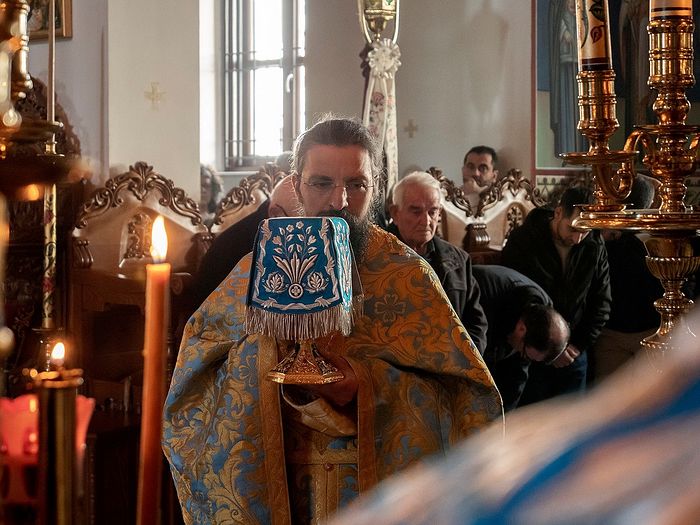 Abbot Archimandrite Paisios during the Great Entrance
Abbot Archimandrite Paisios during the Great Entrance
In today’s Gospel we also hear about Symeon, a man just and devout, who received from the Holy Spirit the promise that he would not die before he saw the Messiah. What is important for us to know is that Symeon grew old in the temple, waiting for this promise to be fulfilled without faintheartedness. In his person, we see a very significant aspect for our life, namely the aspect of time. Time and waiting with patience for the promise of the Lord is very important, because it makes us more humble. Waiting patiently, not desiring to quickly acquire the promise, but devoting years, decades of his life longing for the promise of God—all this humbles the heart of man and makes him more like unto the One Whom he is about to receive—Christ.
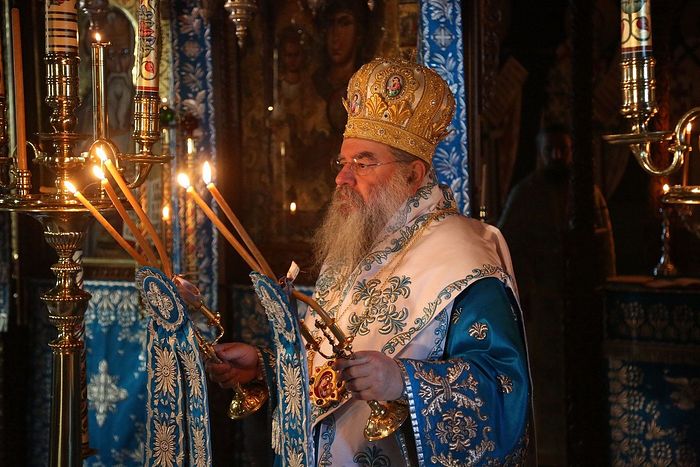 Metropolitan Athanasios of Limassol
Metropolitan Athanasios of Limassol
Another very important aspect is that Symeon received the promise of the Lord with great gratitude: As soon as he received Christ in his arms, he immediately exploded in a hymn of praise to God: Lord, now lettest Thou Thy servant depart in peace, according to Thy word, for mine eyes have seen Thy salvation. The gratitude with which he received Christ in his arms attracted the spirit of prophecy in Symeon and then he prophesied to the Mother of God: He becomes a collaborator with God in revealing the divine will to the Mother of God.
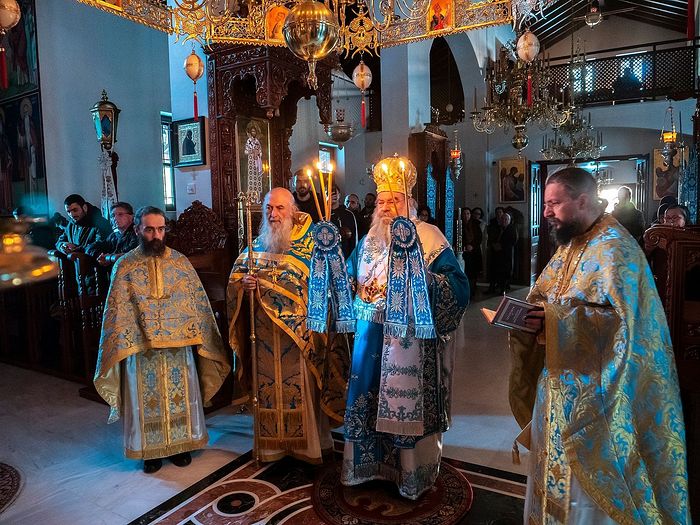 Metropolitan Athanasios, Abbot Archimandrite Paisios, and Elder Zacharias concelebrating the Liturgy
Metropolitan Athanasios, Abbot Archimandrite Paisios, and Elder Zacharias concelebrating the Liturgy
He speaks about the sign of Christ, that this Child is set for the fall and the rising of many, and then he turns to the Mother of God saying, A sword will pierce through your soul, also. Therefore, the gratitude with which he receives Christ in his arms drew upon him the spirit of prophecy and established him in the realm of the divine will, which he revealed to the Mother of God. Thus, we learn that when we receive the gifts of God with gratitude, this gratitude attracts a greater blessing upon us; it makes us ministers of the mystery of God and gives us the gift of being collaborators with Him in revealing His truths even to our fellow men.
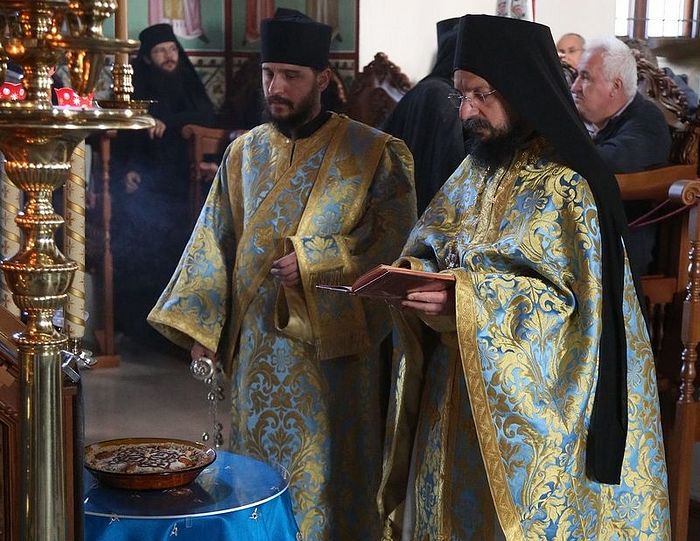 Abbot Archimandrite Paisios blessing the kollyva
Abbot Archimandrite Paisios blessing the kollyva
The Meeting of the Lord is a feast of the Lord, but also a feast of the Mother of God. Today we see that she gives Christ to Symeon, and this is a power, an authority that she always has. The Mother of God is always this bridge through which we can receive Christ. It is the Mother of God who gave to St. Silouan the rare gift of unceasing prayer: As he was praying before her icon, the prayer came out from the icon, went into his heart, and remained with him unto the end of his life.
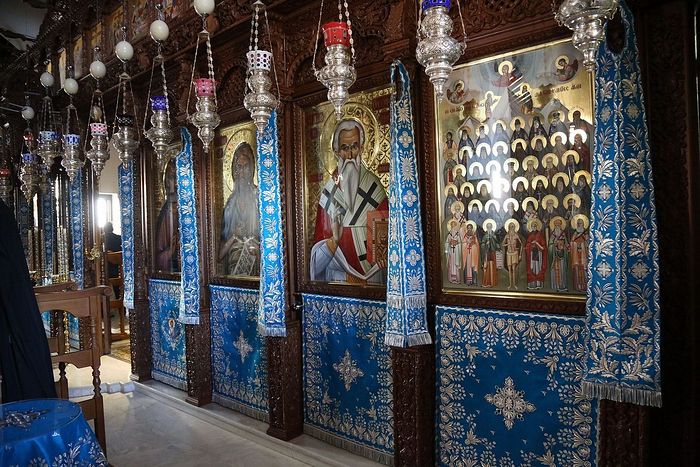 The iconostasis in blue for the Mother of God
The iconostasis in blue for the Mother of God
Those who love the Mother of God are very privileged, because they surely go through many spiritual changes. The monks of Mount Athos may even scandalize with their love for her, and some do protest that they love her as God. However, they do not consider her as God, they simply love her much because they have benefited much.
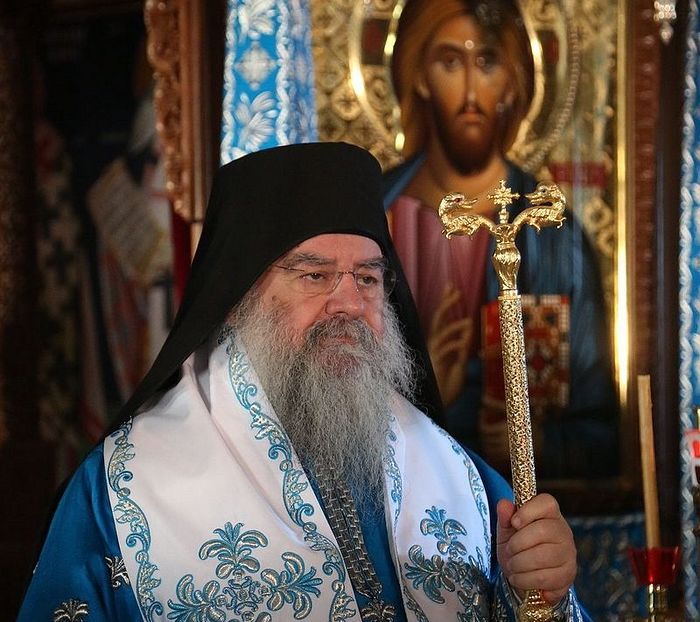 Metropolitan Athanasios of Limassol
Metropolitan Athanasios of Limassol
So, today we must remember that the priesthood of Christ is a priesthood of sacrifice. The more we bear this sacrifice of praise in our life, and keep a painful heart out of gratitude to God and because we are unable to thank Him as He deserves, the more this royal priesthood will become alive in us and our life will be a constant presentation. We pray day and night and we come to the Liturgy because the purpose of our life is to learn how to present ourselves before God in a way that is pleasing to Him, so that we can present ourselves in the same way that day, when He will come again with glory.
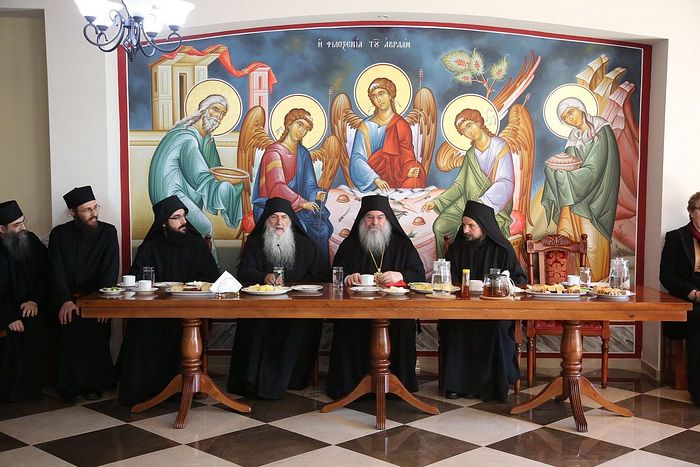 Metropolitan Athanasios, Abbot Paisios, Elder Zacharias, and brothers of the monastery at trapeza
Metropolitan Athanasios, Abbot Paisios, Elder Zacharias, and brothers of the monastery at trapeza
***
To learn more about the Monastery of St. John the Forerunner in Mesa Potamos, Cyprus, see our interview with the brotherhood, “The Russian Royal Martyrs, the American Saints, and a Greek Monastery in the Mountains of Cyprus.”
The monastery is the publisher of the first-ever Greek-language biography of the Russian Royal Martyrs. The captivating book, The Romanov Royal Martyrs: What Silence Could Not Conceal, has also been published in English. Learn more about the book at its official website.


